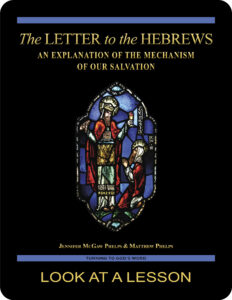little faith
 In the Gospel According to Matthew 6:30 (NABRE), we encounter “you of little faith.” This phrase demonstrates one of the more interesting things
In the Gospel According to Matthew 6:30 (NABRE), we encounter “you of little faith.” This phrase demonstrates one of the more interesting things
about the Greek language that doesn’t often translate cleanly into English.
In Greek, it’s possible to take two or more words and to mash them together to form a single new word. In this week’s example, we have the Greek word for faith, πίστις (pistis) and the Greek adjective for little or small, ὀλίγος (oligos). These two words are combined to make the new word, ὀλιγόπιστοι (oligopistoi). This word is used as a plural noun, so it refers to a number of people that are of little faith.
Translating this word as “you of little faith,” as I and many others have done, necessarily changes the character of the remark by adding a formality and a weight to it that may well not have been intended by the author.
related topics: belief; believe in Jesus; faith; faith & trust; justification
you also may like our study of the Letter to the Hebrews (digital only)
 Many Christians struggle to understand one of the central mysteries of our faith: how Jesus can be both human and divine at the same time. The Letter to the Hebrews: An Explanation of the Mechanism of Our Salvation, an 18-lesson Catholic Bible study with an imprimatur, offers an in-depth look at the way in which Jesus’ dual nature allows for the salvation of humanity. The Letter to the Hebrews is designed to provide information that will encourage Christians to remain faithful. Click on the book’s cover to view a sample lesson.
Many Christians struggle to understand one of the central mysteries of our faith: how Jesus can be both human and divine at the same time. The Letter to the Hebrews: An Explanation of the Mechanism of Our Salvation, an 18-lesson Catholic Bible study with an imprimatur, offers an in-depth look at the way in which Jesus’ dual nature allows for the salvation of humanity. The Letter to the Hebrews is designed to provide information that will encourage Christians to remain faithful. Click on the book’s cover to view a sample lesson.
 Click on the picture of the statue of Moses with horns (above) to learn more about Lost in Translation. A new entry is archived each Monday. Contact us to receive Lost in Translation by email every week. You may use any of the contact links on our website to ask Matthew a question
Click on the picture of the statue of Moses with horns (above) to learn more about Lost in Translation. A new entry is archived each Monday. Contact us to receive Lost in Translation by email every week. You may use any of the contact links on our website to ask Matthew a question
